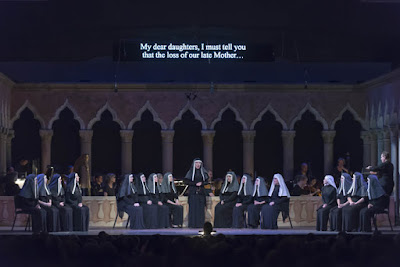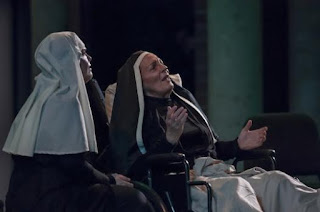As there seems to be no upward limit of humidity in New York, we finally made a run for it and escaped Manhattan last weekend. Though Caramoor isn’t terribly far outside the city, it was far enough to avoid the humidity and a perfect day trip. A twenty year absence found Caramoor even more beautiful than I remembered, full of blooming gardens and cool gazebos. A sound installation with benches making haunted house sounds and loopy whistles seemingly responding to your every move added a touch of whimsy to the beauty of Caramoor’s grounds. We joined picnickers for dinner and then ambled over to the star of the evening, a semi-staged performance of Poulenc’s Dialogues of the Carmelites.
The atmosphere was reminiscent of Tanglewood, which I only first attended last year, though Caramoor isn’t as big a stage, the crowds were accordingly not as big which was rather nice. It wasn’t quite as much of a scene as Tanglewood is. The smaller venue in the country with fewer people translated into nature being more a part of the production. Crickets could be heard chirping during the quieter parts of the performance, and I was greatly entertained by a couple of rogue fireflies that entered the Venetian Theater.
Dialogues centers around aristocratic Blanche de la Force, who goes into a Carmelite monastery after her carriage is attacked by a mob during the French Revolution. She is terrified and seeking refuge. Soprano Jennifer Check was striking as the naïve and frightened Blanche; her voice was beautiful. As the story evolves, we see that Blanche is not shielded from the outside world, but her time with the Carmelites helps her to overcome her “fear of fear” as her brother puts it. First the prioress dies an agonizing death. Deborah Polaski as Madame de Croissy, the prioress facing death, and perhaps her fear of death, was intense. Her rage at God claiming he has abandoned her despite her years of service was chilling. She was far and away the best actress of any of the singers onstage and I found her riveting.
Things continued to worsen when the chaplain is forbidden from preaching and then a crowd arrives at the convent saying the nuns must give up their habits. The nuns take a vow of martyrdom, though Mother Marie, the head of the nuns after the prioress’ death insists that all must agree. Young Sister Constance, a simple country girl and a bit of a talker, Blanche’s close friend, is the only dissenter, but then changes her mind when seeing the rest of the group ready to die for their faith. Sister Constance was sweetly sung by Alisa Jordheim.
At this point Blanche runs away back to her family home and discovering her father guillotined, becomes a servant to those who used to serve her. Mother Marie, well sung by Jennifer Larmore, worried for Blanche’s safety, seeks her out and urges her to rejoin the women. Too fearful, Blanche (wisely) refuses. The nuns are arrested and condemned to death; they accept their fate. Each voluntarily marches to the guillotine, and Blanche overcoming her fear, joins them in the end.
Conductor Will Crutchfield and Orchestra of St. Luke’s was great and one of the highlights of the production. Some of the singers, particularly the few men in the opera were could not be fully heard over the orchestra, but that’s ok, the ladies ruled the night.
-Elizabeth Frayer
Related Links:





Leave a Reply